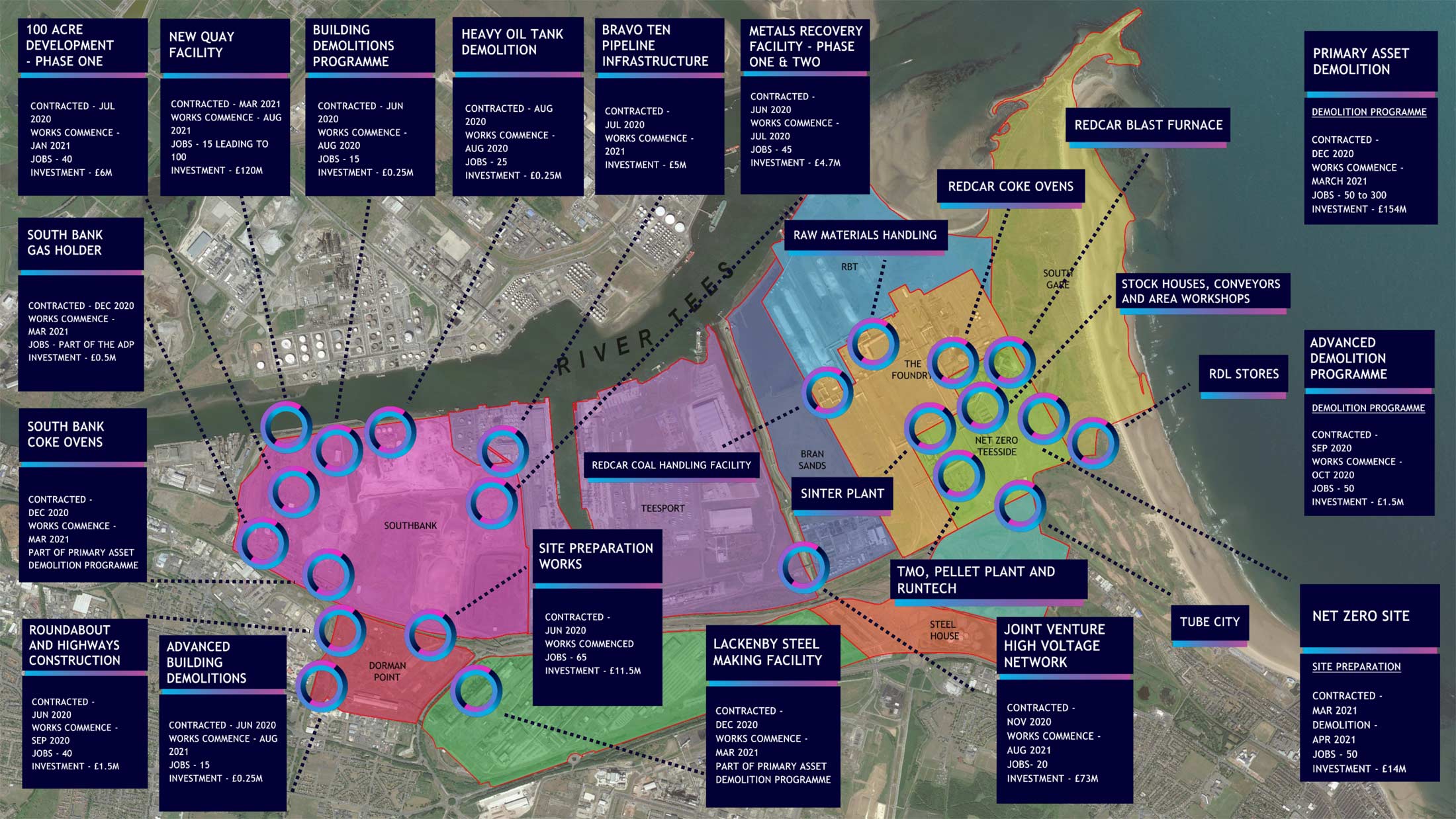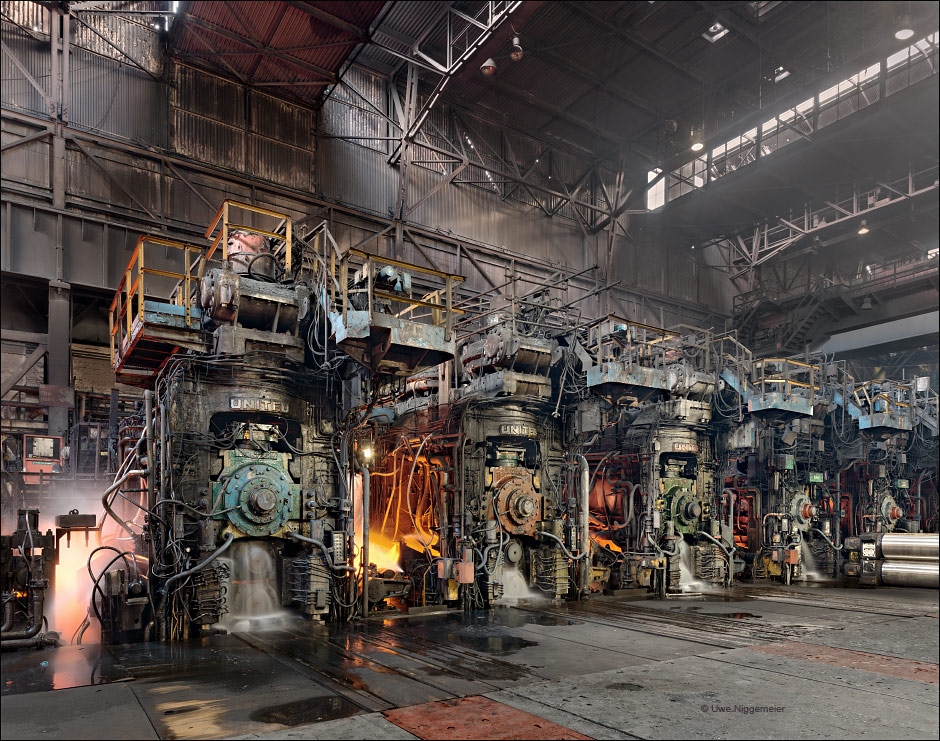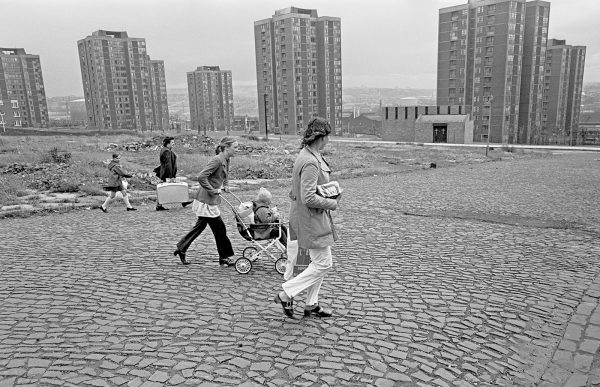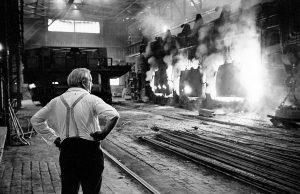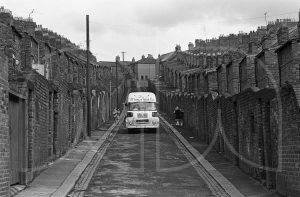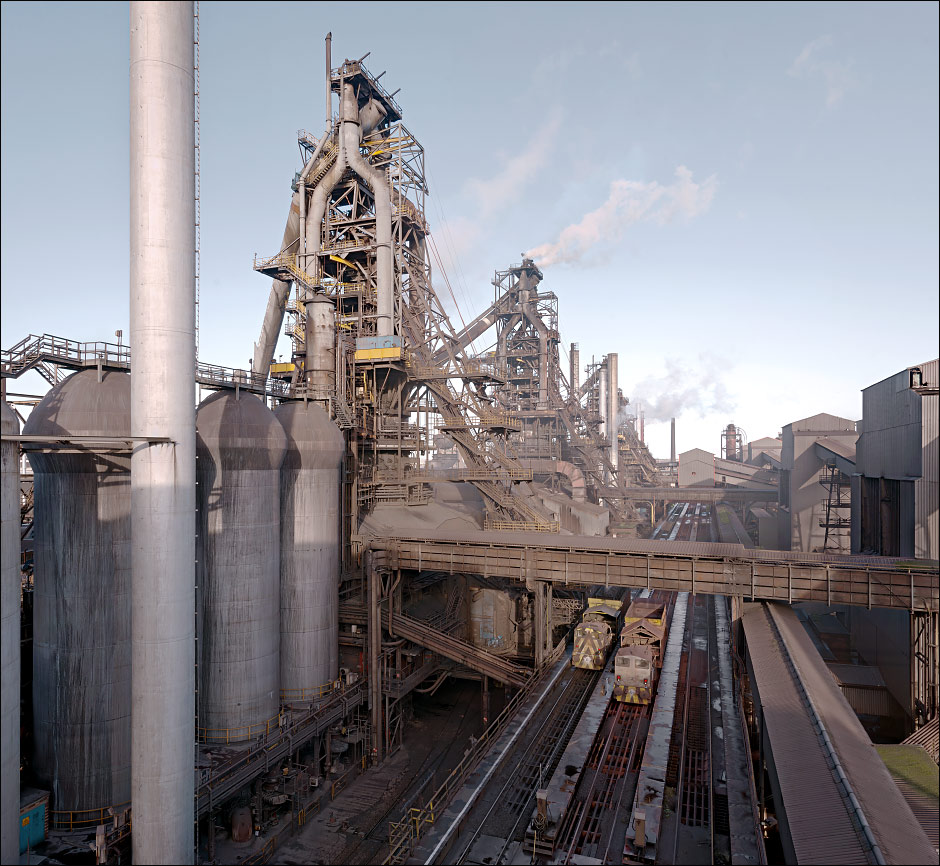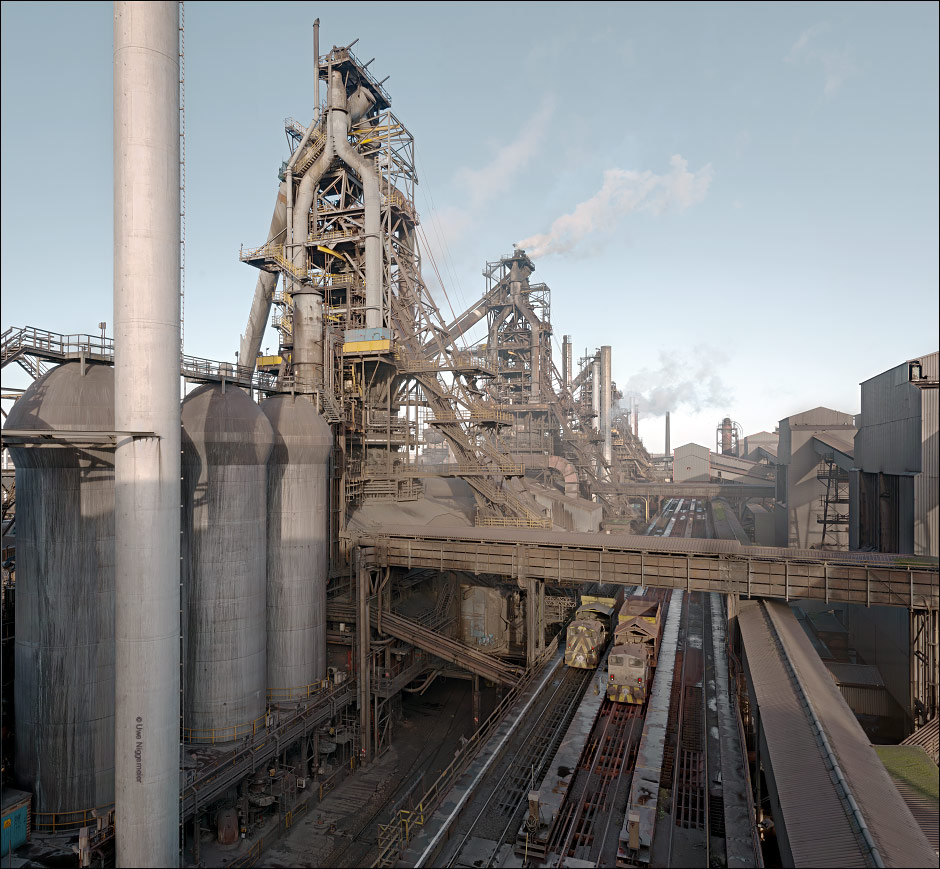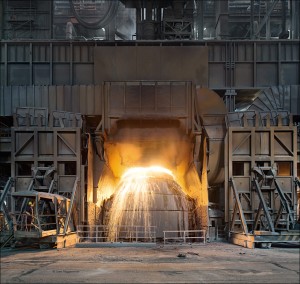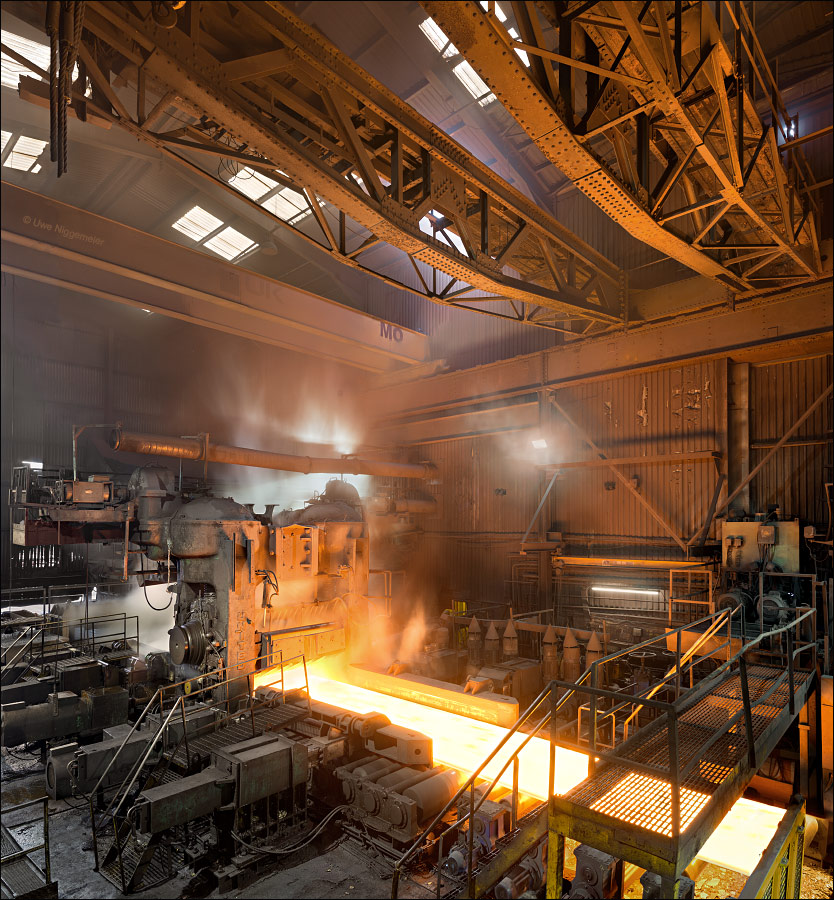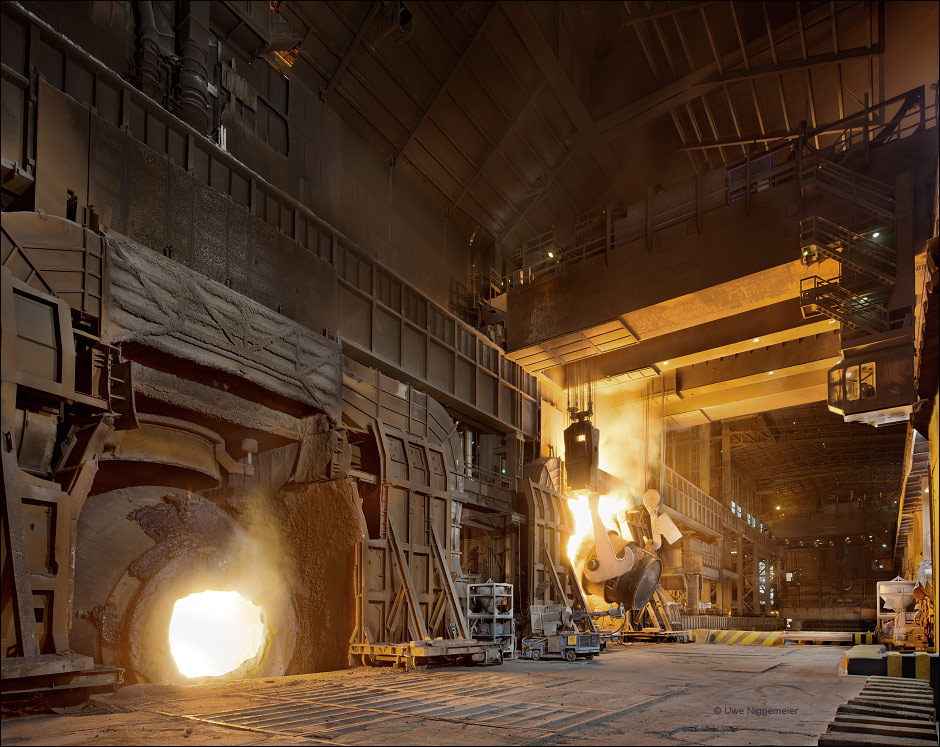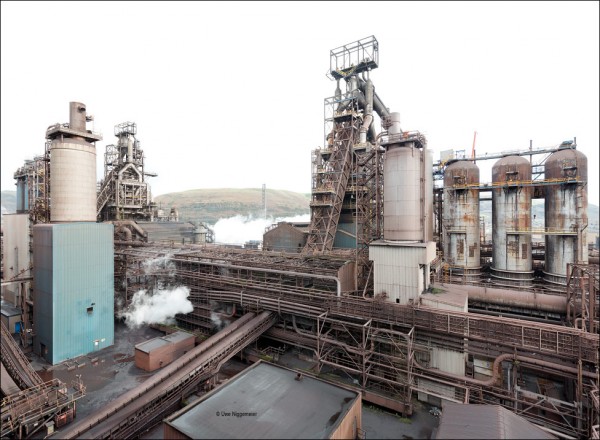Category Archives: GB
The Port Talbot Hot Strip Mill
Probably only very few industrial facilities still operate today that were financed by the Marshall Plan (European Recovery Program) between 1948 and 1952.
One of them is the 80” hot strip mill in Port Talbot, Wales. 
It was to become the core unit of the expansion plan “K” for the steelworks of the Steel Company Of Wales on the Welsh coast.
From 1947 on, the Abbey Works were built on 220 hectares south of the existing Margam Works.
The largest single investment in the history of the British steel industry.
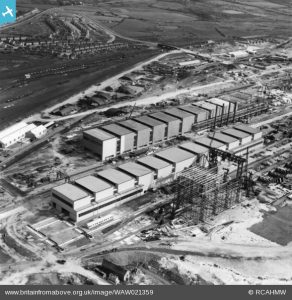 The fully continuous hot strip mill had 4 roughing stands and 6 finishing stands. It had a total driving power of 33500 kW. The plant was designed and built by United Engineering Comp. from Pittsburgh and financed with $27 million from the Marshall fund.
The fully continuous hot strip mill had 4 roughing stands and 6 finishing stands. It had a total driving power of 33500 kW. The plant was designed and built by United Engineering Comp. from Pittsburgh and financed with $27 million from the Marshall fund.
It went into operation in 1951 and is still largely unchanged today, except for the roughing stands (new construction in 2014).
Trente Glorieuses
Looking back on the Trente Glorieuses, the allegedly glorious thirty post-war years until the beginning of the steel crisis in 1975, can of course not only be a review of the now unimaginable wealth of heavy industrial installations during this period.
It is also always a look back at a lost working class culture. And nowhere was this more pronounced than in the U.K..
One photographer who has documented this era in breathtaking pictures is Nick Hedges who was kind enough to allow me to show some of his pictures here.
There are many more on his website: Nick Hedges Photography.
And there was no other band in the late 70s and early 80s that more accurately described and interpreted the decline of this culture than The Jam:
Drink lots of beer and wait for half time results,
Afternoon tea in the light-a-bite, chat up the girls, they
Dig it!
Saturdays girls work in tescos and woolworths,
Wear cheap perfume cause its all they can afford,
Go to discos they drink baby cham talk to jan, in bingo
Accents.
Saturdays kids play one arm bandits,
They never win but that’s not the point is it,
Dip in silver paper when their pints go flat,
How about that, far out!
Wallpaper lives cause they all die of cancer,
What goes on, what goes wrong.
To selsey bill or bracklesham bay,
Think about the future, when they’ll settle down,
Marry the girl next door, with one on the way.
Not given a thought, its the system,
Hate the system, what’s the system?
Wear v-necked shirts and baggy trousers,
Drive cortinas fur trimmed dash boards,
Stains on the seats – in the back of course!
Hand Rolling
Probably one of the last out of the many small Sheffield based rolling mills. The Little Matlock Rolling Mill in Sheffield, England was built in 1864 then driven by the water power of the Loxley River.
In 1957 an electric motor replaced the water wheel (which is still there).
The mill was later owned by Barworth Flockton Ltd and in 1997 it was taken over by Firth Rixson Ltd.
After a two year closure Pro-Roll Ltd took the site over in 2001 and saved the rolling mill from demolition.
Pro-Roll Ltd today hand rolls bars in small lots and from speciality alloys.
stahlseite.de
www.stahlseite.de
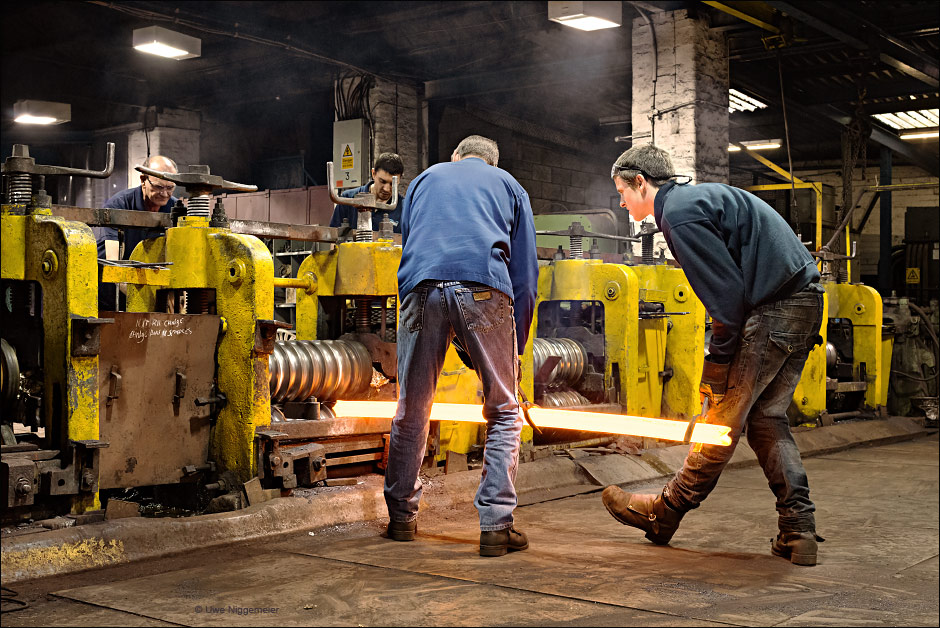
British Steel Ltd.
former Tata Steel, Corus, British Steel Corp., Appleby Frodingham is on the verge of collapse.
Talks with the government on rescuing the steel group failed on Wednesday.
British Steel is owned by private equity group Greybull Capital, main products are rails.
According to Greybull shrinking orders due to Brexit-related issues and difficult market conditions are to blame for the financial problems.
llanwern Blast Furnace No.3

One of the most short-lived fully integrated plants in the history of steel making was torn down 15 years ago.
Built by the Welsh steel maker Richard Thomas and Baldwins Ltd in 1962 the site became part of nationalised British Steel Corporation in 1967 and was called Llanwern works from then on.
In 1974 No. 3 blast furnace was the third to be built on the site and with it’s 11,2 m hearth and two tapping holes it was the first modern large volume furnace in Britain.
Furnaces No. 1 and No. 2 had a hearth diameter of 9,1 m.
Because of the lack of a deep-water iron ore unloading terminal the iron and steel making facilities, including the three 175 t converters of the BOF shop, where closed down in 2001 after producing steel for less than 39 years.
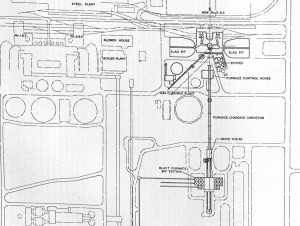
Sheffield Steel
Now at Stahlseite.
The Little Matlock Rolling Mill in Sheffield, England was built in 1864 then driven by the water power of the Loxley River.
In 1957 an electric motor replaced the water wheel (which is still there).
The mill was later owned by Barworth Flockton Ltd and in 1997 it was taken over by Firth Rixson Ltd.
After a two year closure Pro-Roll Ltd took the site over in 2001 and saved the rolling mill from demolition.
Pro-Roll Ltd today hand rolls bars in small lots and from speciality alloys.
Four Queens
Victoria, Anne, Bess and Mary.
Further viewing at Stahlseite.
Tata Steel’s integrated steel plant in Scunthorpe, GB was founded in 1864 under the name Frodingham Iron Works.
Iron was produced from local iron ore deposits since 1865. A Thomas converter steel making shop started it’s production in 1890.
In 1912 Frodingham took over the nearby Appleby Iron Co. (founded in 1874) to form the Appleby Frodingham Steel Co.
This enterprise became part of the United Steel Companies in 1937. In 1939 two new large volume blast furnaces were installed (Mary & Bess). In 1954 Anne and Victoria were added to complete the “Four Queens”.
In 1967 the United Steel Companies became part of the newly founded British Steel Corporation.
The Anchor project (1969-1973), one of the largest investments into the British steel industry ever, brought a new BOF shop, new rolling mills and the Immingham iron ore terminal by the Humber river.
British Steel merged with Koninklijke Hoogovens from the Netherlands to form Corus in 1999. Eigth years later Corus was taken over by the Tata Steel group from India.
Tata Scunthorpe today consists of 4 blast furnaces (three active) a BOF shop containing three 300 ton vessels, a slab caster, a bloom caster and three rolling mills (rails, heavy plate and wire).
Spartan UK
Images now on my website.
The heavy plate rolling mill in Gateshead, UK dates back to the former Redheugh Iron and Steel Co founded in 1918. The company rolled plates and sheet and provided welding, steel constructions and engineering. Redheugh Co employed more than 800 people in the 1960ies.
In 1970 the company was taken over by Spartan Steel&Alloys from Sheffield.
In 1975 a new 2,1 meter heavy plate rolling stand was installed.
Spartan Redheugh was absorbed by the Firth holding company in 1988.
In 2001 the Gruppo Malacalza of Italy bought the plant and sold it again in 2008 to the Metinvest group from the Ukraine.
The Abbey Works
Though largely downsized the Welsh heavy industry is still worth a visit. The old Abbey works in Port Talbot provide the largest BOF vessels I have seen so far and the longest serving hot strip mill in Europe.
Images now on my website.
Three steel mills were built on the shoreline of Port Talbot south of Swansea, Wales over the last 110 years.
The Port Talbot Works (1902-1961)
The Margam Works (1918-1963)
The Abbey Works (1951-Present)
The Port Talbot works were founded in 1902 by the Gilbertson family. The mill produced iron from imported pig iron in three cupola furnaces and ran an open hearth shop with two furnaces.
The mill was shut down due to technical problems in 1903 and reopened in 1906 by the Port Talbot Steel Company Ltd. .
Two rolling mills and a new open hearth shop were built in between 1908 and 1914.
In 1917 the plant became fully integrated with the construction of the new Margam site half a mile southward. Two blast furnaces , a coking plant and a new open hearth shop were built until 1922. In 1930 the mill became part of the GKB (Guest, Keen, Baldwin) Steel company. Main product were plates and rails.
In 1941 a third blast furnaces became operable at the Margam site.
All three blast furnaces were completly rebuilt after WW II.
In the late 1940ies a plan to build a new huge integrated steel plant south of the Margam works the so called Abbey works was implemented.
Centerpiece of the new site was a wide hot strip mill built by United Engineering of Pittsburgh and partly financed by funds from the Marshall plan.
This rolling mill became operational in 1951. A new open hearth shop containing eight 200 ton furnaces started production in 1952. Two new blast furnaces were built on the site in 1956 and 1959 (No. 4 & No. 5).
The Port Talbot works were closed down and dismantled in 1961 and the old Margam site followed in 1963. Only blast furnace No. 3 survived as a standby furnace and was relighted in 1991 for one year and has been dismantled recently.
In 1967 the Steel Company Of Wales became part of the newly founded British Steel Corporation.
In 1969 a new BOF shop providing two 300 ton vessels was installed replacing the old open hearth furnaces.
The hot strip mill was widely overhauled in the late 1980ies (receiving a new roughing stand).
British Steel merged with Koninklijke Hoogovens from the Netherlands to form Corus in 1999. Eigth years later Corus was taken over by the Tata Steel group from India. Blast furnace No. 4 was completly rebuilt in 2012.
Tata Steel Port Talbot today produces hot and cold rolled flat products and supplies slabs to the hot strip mill in Newport, Wales.

